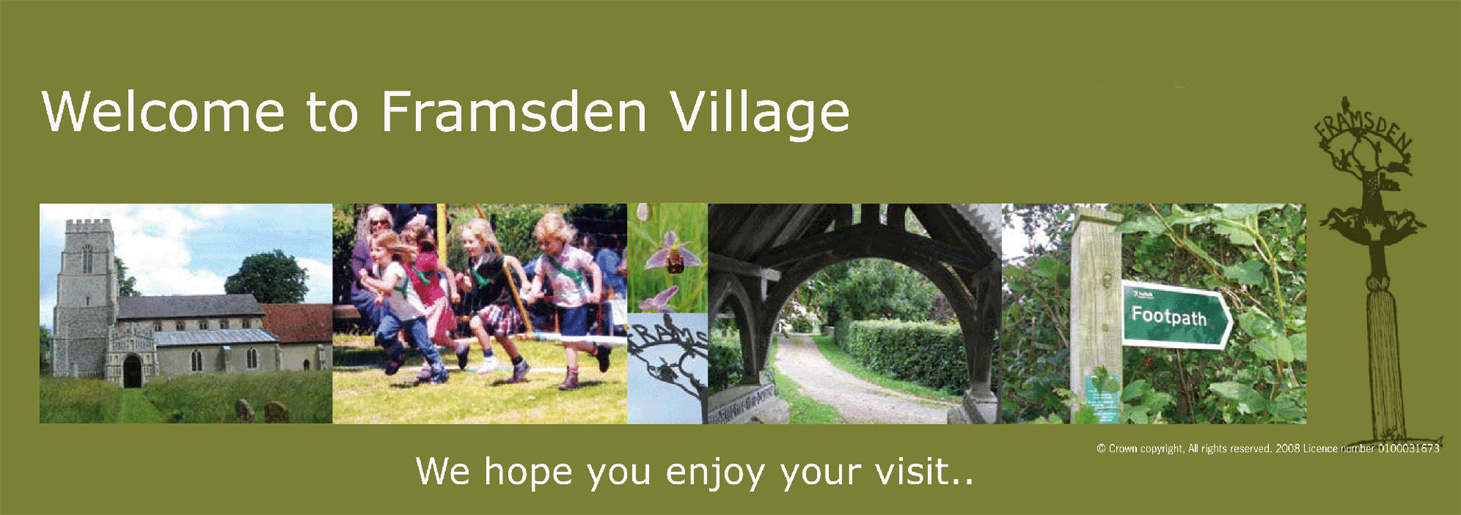
Framsden Village is 10 miles (16 km) north of Ipswich and 3 miles (5 km) south of the small market town of Debenham, Suffolk. The B1077 runs through the west of the Parish and the A1120 cuts across the north of the Parish. The majority of homes are situated along Framsden Street with smaller clusters at Peats Corner, along the A1120 and St John’s Row in addition to more scattered houses towards Otley and Cretingham.
There is also a significant number of more remote farmhouses and tenant farms of the Helmingham Estate. The total population of Framsden in the census of 2001 was 299, with 125 households, 52 people under 16 years, 201 of working age and 46 over 65 years.
Framsden is mostly within the Helmingham Estate and a lot of
property is tenanted.
These are traditional estate 2 bedroom cottages or large farmhouses
which are sometimes rented as temporary accommodation. The village
is surrounded by arable farmland but enjoys one of the greatest
lengths of public footpaths (around 16 miles) for its size and has
conservation areas of ancient meadow and veteran trees.
The village is surrounded by arable farmland but enjoys one of the
greatest lengths of public footpaths (around 16 miles) for its size
and has conservation areas of ancient meadow and veteran trees. The
hedgerows are plentiful and, away from the road, are only trimmed
every 3+ years, affording pleasant walking and harvesting of
hedgerow fruits.
The Helmingham Estate’s management of much of Framsden’s arable land
includes preserving veteran trees, ancient hedgerows, old ponds and
ancient meadows rich in plant and wildlife diversity. These
achievements have been acknowledged by the estate farm
winning the FWAG (Farming and Wildlife Advisory Group) Conservation
Award for “high level of commitment shown to the principles and
delivery of conservation, combined with good farming – an innovative
approach to cultivations based on minimum tillage across the whole
farm”.
Framsden had an attractive pub - The ‘Doberman Inn’. Memorable
events included the hosting of Morris dancers and twinning events
with St Etienne de Lisse. For several years in the 1990s the village
also hosted a lively steam event and Street Fair. The village shop
and Post Office on the street was lost in the early 90’s. Sadly the
pub has been closed since the Landlady Sue Frankland died in 2016.
The pub has now been purchased by the local community and is in the
process of being renovated, it will hopefully reopen again in the
winter of 2024 and will revert to it's original name of the
"Greyhound", a news update of this can be found
here
Framsden is fortunate to host the Helmingham Primary School and Old
Schoolhouse Nursery on the edge of the village; accessible by
footpath and drawing children from the local villages.The Old School
House Nursery in Helmingham (next door to the primary school) takes
children from 2 years upwards from a number of local villages and
acts as a feeder to Helmingham County Primary School.
We have a small village hall, continually being refurbished , hosting
village activities and events. Framsden has a parish church, St
Mary’s, in the centre of the village, and a Baptist Chapel at the
bottom of Jockey’s Lane near the junction of the A1120 and the
B1077. The historic St Mary’s Church has been a successful concert
venue in the past and the Baptist Chapel ran a ‘Friday Club’ for
children and young people of the area.
The play area was renovated recently for the younger people of the
village by local fundraising and the commitment of the parish
councillors.
The estate cottages and school were designed over 150 years ago by Lord
John
Tollemache, to provide dwellings for estate workers. Two
cottages shared a bread oven and each had an acre of land to grow
food for the family and to fatten a pig. These cottages, once home
to working families, are now described as ‘quaint’ and are mostly
privately rented.
In St John’s Row, water was collected from a pump which can still be
seen on the road side. Before that it came from a pond at the end of
the Row. One resident remembers her father driving the water cart
here to fill up and have a good ‘Yarn’ while pumping.
Oral History about Framsden has been captured by authors such as
George Ewart Evans in ‘Where Beards Wag All’, by Robert Simper in
‘Family Fields’ and more recently by a ‘libraries and heritage’
project to record interviews of Helmingham estate workers, such as
the Clerk of Works and Farm Manager who were employed over 30 years
ago. Another Framsden resident has had his reminiscences of early
years as a gamekeeper published.
We are fortunate to have several Framsden residents who have lived
here all their lives and who can inform us of the history of our
community. They remember which cottages were home to various trades,
can recall events and tales of growing up in this village and the
reality of living as a community self sufficient in most of its
needs. Within the last 70 years Framsden had 2 blacksmiths, 2
butchers and an abattoir, 2 windmills, a carpenter, wheelwright,
pony carts and hurdle maker, brickmaker, cobbler, grocers shop, a
horse drawn cart for transport to Ipswich, a ‘carrier’- taking goods
to and from Ipswich and a tailor at Hill House. The village shop
used to sell necessities – ‘60 years ago the village had deliveries
of milk daily, a baker and grocer each week, paraffin and oil was
purchased from the mill’.
Framsden windmill is a landmark in the village and has a unique
selection of items from the past and bygones to remind us of how
life used to be.
